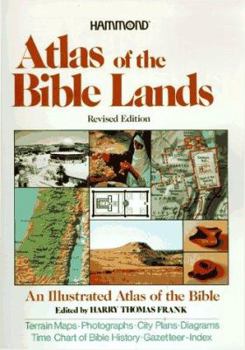Atlas of the Bible Lands
Select Format
Select Condition 
Book Overview
The stories of the Bible come to life with this authoritative, richly illustrated atlas. Follow the Biblical narrative from the earliest ancestors of Israel to the founding of the early Christian... This description may be from another edition of this product.
Format:Hardcover
Language:English
ISBN:0843770562
ISBN13:9780843770568
Release Date:May 1984
Publisher:Hammond World Atlas Corporation
Length:48 Pages
Weight:1.16 lbs.
Dimensions:0.4" x 9.5" x 12.5"
Customer Reviews
5 ratings
This is a great atlas for Biblical history, both past & present!
Published by Thriftbooks.com User , 14 years ago
I've always had an interest in ancient history. I recommend this atlas as a guide to read along with your particular religous history. The maps cover ancient to modern history & contains topographical maps as well. I had not realized how varied the topography was in the areas covered in the Bible. I am sure that the maps of ancient history sites & towns would be as useful to those interested in the area in general. I've read this cover to cover. I'll do so again & again as the information contained in this volume is a lot to take in in one reading.
Note: the picture on the cover is of the Islamic Shrine 'The Dome of the Rock'
Published by Thriftbooks.com User , 16 years ago
The picture on the cover of this text is of The Dome of the Rock (Arabic: translit.: Masjid Qubbat As-Sakhrah, Hebrew: translit.: Kipat Hasela, Turkish: Kubbetüs Sahra). It is an Islamic shrine. It is not the 'Church of the Holy Sepulchre' as mis-identified in the Atlas itself. The Dome of the Rock is located at the center of an ancient man-made platform known as the Temple Mount (Hebrew, Har haBayit; literally, the Mountain of the House) to the Jewish people and the Haram al-Sharif (Noble Sanctuary) to the Muslims. The platform, greatly enlarged under the rule of Herod the Great, is the site of the Second Jewish Temple which was destroyed during the Roman Siege of Jerusalem in 70 AD. In 637 AD, Jerusalem was conquered by the Rashidun Caliphate army during the Islamic invasion of the Byzantine Empire. And in a rivalrous act of competition with the original historical religions of Jerusalem with long prior religious history in this place, Judaism and Christianity, the Dome of the Rock was erected between 685 and 691 AD. And, unfortunately, there it remains. Jerusalem was recaptured by Saladin on Friday, 2 October 1187 and the Haram was reconsecrated as a Muslim sanctuary. The cross on top of the Dome of the Rock was replaced by a golden crescent and a wooden screen was placed around the rock below. Until the mid-nineteenth century, unsurprisingly and typically, non-Muslims were barred from the area. Since 1967, non-Muslims have been allowed some entry, but non-Muslim prayers on the Temple Mount are not allowed. In 2006, the compound was reopened to non-Muslim visitors free of charge, between 7:30-11:30 a.m. and 1:30-2:30 p.m. during Summer and 7:30-10:30 a.m. and 1:30-2:30 p.m. during Winter. Non-muslims may never enter on Fridays, Saturdays, or Muslim holidays. Entry is through a covered wooden walkway next to the security entrance to the Western Wall known as the Mugrabi or Maimonides Gate. Entry to the mosques themselves is prohibited to non-Muslims, as is access to the Temple Mount through the Cotton Market. Visitors undergo strict security screening, and items such as Hebrew prayerbooks or musical instruments are not allowed. The Muslim presence in the Holy Land began with the initial Arab conquest of Palestine in the 7th century. The Muslim armies' successes put increasing pressure on the Eastern Orthodox Byzantine Empire. In the year 1009, the Fatimid Caliph al-Hakim bi-Amr Allah ordered the destruction of the Church of the Holy Sepulchre. (That's not a surprise, is it.) The Dome was not destroyed but the Sepulchre was. In 1039 his successor, after requiring large sums be paid for the right (no surprise there, either. Dexter Filkins of the New York Times references a conversation with an Iraqi following an interaction with an American, in which the Iraqi says "We take their money, but we hate them."), permitted the Byzantine Empire to rebuild it. Pilgrimages were allowed to the Holy Lands before and after the Sepulchre was rebuil
Best Atlas of Bible Lands Ever Printed
Published by Thriftbooks.com User , 17 years ago
My husband and I teach an indepth class on the Old Testament one semester then the New Testament the next semester alternating. We used the previous edition of this same book, but we were even more blown away by the new revised edition. Every student of the Bible needs to purchase one. They are priceles.
Atlas of the Bible Lands
Published by Thriftbooks.com User , 19 years ago
This book has excellent and colorful maps plus descriptions of the Bible lands. The maps and information are so attractive that they inspire the reader to spend time with them. I teach a course entitled INTRODUCTION TO THE OLD TESTAMENT and this book is a required text. Reading the Old Testament is more easily understood as the locations and happenings are highlighted in this book.
Excellent Study Help
Published by Thriftbooks.com User , 21 years ago
For the price this atlas out ranks the others by far. Most of the time it provides the exact map/information I need for my study. I have several others that I have picked up through seminary and later but this is the one I still turn to. It is a classic that is worth every penny.





